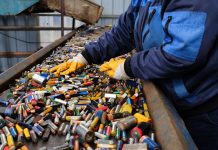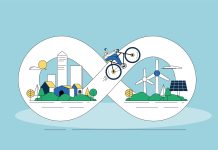Maria Nikolopoulou, Member of the European Economic and Social Committee, details why the circular economy is a recipe for success
Who would have thought a few years ago, when we were holding EU-level discussions on how to promote the circular economy as an alternative business and consumption model, that we would be close to implementing it as the default for moving forward? But do we have all the ingredients necessary to bake the perfect cake?
Awareness
COVID-19 has reminded us that our way of living, especially in developed countries, is not 100% compatible with biodiversity and people’s wellbeing. Some of those who were not convinced that we need a radical shift in our consumption and production patterns have now seen clearly that we have no choice but to react. And by reacting, I mean making a shift in terms of our understanding of the availability of resources. We can no longer assume that there will be enough resources to get by forever, nor that the damage mankind is doing to nature is tolerable because nature will always survive.
Timing
Being aware of the situation is not enough to spark rapid change. This is where the pandemic will be a catalyst. One concern voiced in the past regarding how to implement the Sustainable Development Goals, in which circularity can play a role, was how we can do so without disrupting the economy. That no longer applies as the economy has already been turned upside down and we need to come up with a plan to put it back on track. This is our big opportunity to rebuild a robust, up-to-date economy that brings innovative and modern solutions to the table, uses resources wisely and works for people and nature.
Alliances
Most people’s brains resist change. This is a logical reaction that responds to a sense of being in control of a situation or feeling comfortable with things the way they are. Fortunately, for nature and our society, a smart alliance has been born. On the one hand, we have consumers who have become aware of the longterm impact of their decisions and their power to drive change. On the other, we have visionary entrepreneurs who have seen that the faster they move to a circular business model, the earlier they will gain a “sustainable” market share and so increase their profits and even decrease their costs. Not to mention the very positive impact on the environment and their corporate social responsibility.
Knowledge
Some people also argue that “inventing” is very difficult. Where do we start? How can small businesses get on board? Well, there is some good news on that front. We do not have to invent everything: other people have already created, tested and implemented solutions. It’s clear that bigger companies have much more room to manoeuvre when it comes to experimenting and investing in R&D. Luckily enough, the circular economy also comes with a mindset shift, that fosters collaboration and the exchange of good practices. This is one of the aspects that we cherish most at the European Economic and Social Committee and this is why we created a tool to facilitate this collaboration.
A few years ago, we worked with the European Commission to launch the European Circular Economy Stakeholder Platform, a virtual space where people from different backgrounds and with different interests can find relevant information and work together to speed up the shift to circularity. The platform gives everyone free access to studies, circular solutions, new products and action plans; most importantly, it enables them to be in contact with the circular economy community.
Framework
The EU Green Deal, in combination with the Sustainable Development Goals, is an ambitious proposal that has shown that there is the political will to move things forward. It will establish the proper long-term legislative framework guaranteeing a level playing field and legal certainty that will clarify technical doubts and spark private and public investment.
Money
A massive cash influx is not just necessary for companies needing to switch business models, create new jobs and adapt their production lines: it is also needed to assist sectors and people who will not be able to adapt fully to the change. Will the budget be adequate? There are always doubts when it comes to the quantity of resources and whether the Member States will successfully absorb and channel the money in the right direction.
In addition to the funds allocated to the Green Deal and the Circular Economy Action Plan, there are several EU budget headings which we can tap even if they are not specific to the circular economy, such as the CAP, the Cohesion Funds and the Recovery Funds. We just need to make sure that the new investments are designed to be circular.
It looks like the future is already here. Let’s keep an open mind and put pressure on decision-makers so that we do not miss this once in a lifetime opportunity.











